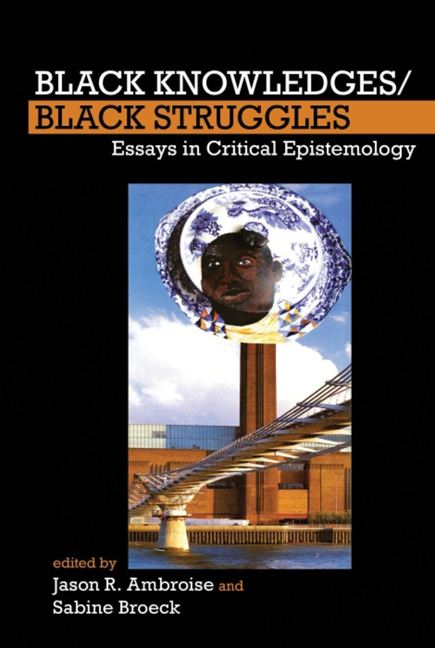Book contents
- Frontmatter
- Contents
- List of Figures
- List of Contributors
- 1 Black Knowledges/Black Struggles: An Introduction
- 2 “Come on Kid, Let's Go Get the Thing”: The Sociogenic Principle and the Being of Being Black/Human
- 3 Respectability and Representation: Black Freemasonry, Race, and Early Free Black Leadership
- 4 Ethno-Class Man and the Inscription of “the Criminal”: On the Formation of Criminology in the USA
- 5 Dehumanization, the Symbolic Gaze, and the Production of Biomedical Knowledge
- 6 Performing Scientificity: Race, Science, and Politics in the USA and Germany after the Second World War
- 7 Imaginary Black Topographies: What are Monuments For?
- 8 The Ceremony Found: Towards the Autopoetic Turn/Overturn, its Autonomy of Human Agency and Extraterritoriality of (Self-)Cognition
- Works Cited
- Index
1 - Black Knowledges/Black Struggles: An Introduction
- Frontmatter
- Contents
- List of Figures
- List of Contributors
- 1 Black Knowledges/Black Struggles: An Introduction
- 2 “Come on Kid, Let's Go Get the Thing”: The Sociogenic Principle and the Being of Being Black/Human
- 3 Respectability and Representation: Black Freemasonry, Race, and Early Free Black Leadership
- 4 Ethno-Class Man and the Inscription of “the Criminal”: On the Formation of Criminology in the USA
- 5 Dehumanization, the Symbolic Gaze, and the Production of Biomedical Knowledge
- 6 Performing Scientificity: Race, Science, and Politics in the USA and Germany after the Second World War
- 7 Imaginary Black Topographies: What are Monuments For?
- 8 The Ceremony Found: Towards the Autopoetic Turn/Overturn, its Autonomy of Human Agency and Extraterritoriality of (Self-)Cognition
- Works Cited
- Index
Summary
This collection of chapters is organized around the central but critically neglected theme of the role of knowledge and epistemic formations within the context of social movements for human emancipation. The collection specifically explores this thematic within the context of the localized and/or global struggles – both contemporary and historic – of the peoples of Black African and Afro-mixed descent against their forcibly and systemicallyimposed subjugated and condemned status over the past five centuries within trans-Atlantic societies of the West. And based on the overall assumption that a systemic connection exists between the structural subjugation/condemnation and “thingification ” (Césaire, 1972: 42) of Black peoples globally and their dehumanization and/or invisibilization within the epistemic formations of the post-medieval West – be these religious, humanistic, aesthetic, naturalistic, social scientific, or some combination thereof – the collection's editors take the following position.
This position is that it is no coincidence that the self-assertions and emancipatory mobilizations by members of this population against their imposed subjugation/condemnation and dehumanization, logically also carried with them critiques of, challenges to, and/or counter-formulations against and beyond the same epistemic formations that coincided with and legitimized Black peoples’ imposed abject -status within the various socio-human formations of Western modernity, be these of the colonial/ imperialist, “state-controlled,” or ostensibly “laissez-faire ” kind. And whether explicitly articulated or not, these critiques, challenges, and/or counter-formulations necessarily point towards new ways of “knowing,” new ways of “being ” human, and/or new conceptions of “freedom” and visions for human emancipation. Indeed, one could say in summary of Sylvia Wynter, who contributes the most far-reaching chapter in this vein, that “Black knowledges” – as an integral part of an overall conception of “Black struggles” – have necessarily been existentially forced to confront these issues as here articulated within the following interrelated set of questions. (1) How has the human been constituted and conceived within the hegemonic epistemic formations of Western modernity, including most centrally the peoples of African and Afro-mixed descent historically classified by the West as “Negro”/“Colored”/“Black”? (2) What sub-set human populations have been constructed and made to embody specifically modern Western notions of Self(s) and Other(s)?
- Type
- Chapter
- Information
- Black Knowledges/Black StrugglesEssays in Critical Epistemology, pp. 1 - 20Publisher: Liverpool University PressPrint publication year: 2015



